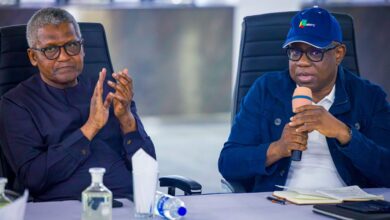
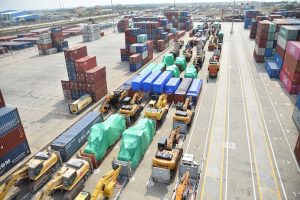
With a focus on capturing regional growth by connecting global trade and infrastructure development, Lekki Freeport Terminal is efficiently bridging the supply chain gap in trade between Nigeria and the rest of the world.
For a maritime sector grappling with infrastructure development, obsolete ports, and shallow draughts, the emergence of LFT in the Nigerian maritime sector has solidified the country’s position as a maritime hub, featuring expanded berths and terminals that can accommodate large vessels, as well as a modern port equipped with state-of-the-art facilities. All these factors are enhancing connectivity to international markets and driving economic growth, with the presence of CMA-CGM, Maersk, COSCO Shipping, ONE, and ZIM, leading shipping lines that further solidify the terminal’s role as a key player in global trade.
Operational Excellence as Key Progress Driver
Lekki Free Terminal continues to put the wind in the sails of its operation through consistent deployment of technological innovations and strategic collaborations that have helped to drive progress.
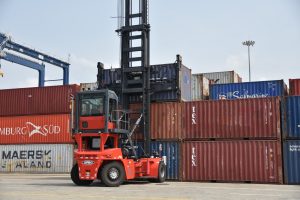
With a remarkable 40 per cent year-on-year growth in throughput volume for 2025, the terminal’s capacity and quality of service delivery as a preferred gateway for Nigeria’s import and export trade were further solidified. This can only be attributed to its strategic collaborations, which contribute to the efficiency of port operations and operational excellence, supported by state-of-the-art facilities. This enables vessels to have a quick turnaround time and experience seamless cargo handling, compared to other ports in the country.
As proof of its influence and partnership in enabling efficient and seamless operations, the terminal enjoys the support of regulatory agencies, including the Nigerian Ports Authority, Nigerian Export Processing Zones Authority, Nigeria Customs Service, Nigerian Drug Law Enforcement Agency, Nigeria Police, and the Department of State Services. The support and cooperation of these agencies have contributed immensely to the success of the port with their presence affirming a commitment to streamlining operations and facilitating the smooth movement of cargo.
The terminal’s design, along with its state-of-the-art post-Panamax ship-to-shore cranes, RTGs and other cargo handling equipment, sets it apart from other overcrowded terminals, enabling it to operate free of congestion, both at the quay and in the yard. Thereby, guaranteeing optimal vessel productivity during discharge and load operations.
The service delivery and state-of-the-art facilities continue to attract businesses to the port. A case in point is the presence of leading shipping lines of international repute. Currently, CMA CGM, Maersk Line, COSCO, Ocean Network Express (ONE), and ZIM/GSL make weekly calls at the port, a marker that further cements the ambition of the LFT to become the leading maritime hub in West Africa. These services are expected to attract more foreign direct investment (FDI) and enhance Nigeria’s standing in global maritime trade.
At the time the shipping line services were launched, both Lekki Port and Lekki Free port Terminal management described it as a significant milestone in the terminal’s development and expansion of capacity noting that through strategic collaborations with global shipping leaders, LFT is strengthening its international presence and creating new opportunities for trade and industrial growth in Nigeria and the region.
This milestone was also described as a reflection of LFT’s commitment to positioning the nation as the leading maritime hub in West Africa.
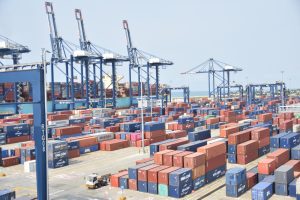
Stimulating Productivity with Infrastructure and Accessibility
A major factor in LFT’s efficiency is the heavy investment in infrastructure, which has enabled increased efficiency and safety. With a strong focus on automation, the terminal deploys technology and robotics to streamline various processes, including cargo handling, gate operations, and tracking. This has boosted overall port operations by reducing human errors and improving productivity.
Add these innovative approaches to its seamless cargo inspection under the surveillance of two FS 6000 scanners with capacity to scan containers in a matter of minutes, along with the availability of four boats provided and operated by the Nigerian Ports Authority to ensure safe navigation and berthing of large vessels, it is more than enough to agree that in a matter of years, the terminal will be a reference point across Africa.
A significant infrastructural boost is the soon-to-be completed Coastal Road and the recently approved construction of the 7th Axial Road, which brings light to the tunnel of accessibility to the port. The two roads are strategically important for port connectivity, making cargo evacuation from Lekki Port convenient and fast.
Spanning a distance of 25 kilometres, with completion projected for 2028, the 7th Axial Road —a dual carriageway —will provide a critical alternative route, offering direct access to the A121 Lagos-Benin Expressway. It is expected to reduce travel time for cargo evacuation from Lekki Port significantly. Currently, trucks travelling from LFT to Lagos via the Coastal Road and the A121 corridor spend an average of 4.5 hours on the journey. The 7th Axial Road is projected to cut this travel time significantly, improving cargo flow, reducing turnaround time, enhancing port efficiency, and lowering overall logistics costs.
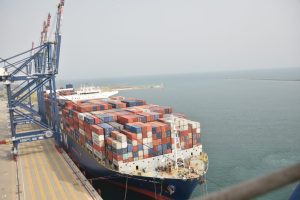
These developments will further boost turnaround time at LFT, considering the multiple access corridors and ongoing roads upgrade initiatives underway, including the federal government’s consideration of connecting the axis to the national rail network. This, if made possible, will enhance trade by facilitating the evacuation of cargo from the terminal to other parts of the country, as well as to neigbhouring landlocked countries. In terms of time efficiency, the terminal holds an enviable reputation as the most efficient maritime gateway in the country, with truck service time at its gates standing at 1.1 hours, a figure that no Lagos-based terminal can match.
Over the last two years, dignitaries who have visited the terminal have consistently praised its technological advancements. So, it was no surprise to learn that the Managing Director of the Nigerian Ports Authority (NPA), Dr. Abubakar Dantsoho, who recently made his official visit to Lekki Deep Sea port commended the management of Lekki Deep Seaport and LFT for their unwavering commitment to operational excellence and port optimization. He went on to state that the NPA will benchmark Lekki Port and LFT’s cutting-edge infrastructure and advanced technology in its broader port modernisation programme.
Still enamoured by the innovation and efficiency, he highlighted the port’s growing transhipment volume, which is meeting the maritime demands of neigbhouring countries and supporting the NPA’s objective of achieving economies of scale. Also, how LFT’s fully automated operations align perfectly with NPA’s goal to implement the Port Community System (PCS), which will pave the way for the long-awaited National Single Window (NSW), designed to streamline the nation’s trade processes.
Echoing the thoughts of the MD of NPA, it is reassuring to know that the future is indeed very bright for the Nigerian maritime sector going by the exceptional praise of the LFT and Lekki Port’s ability to berth super post-Panamax vessels and deliver rapid cargo and vessel turnaround, which he describes as “a strategic asset in enhancing Nigeria’s export competitiveness.”








